00:41
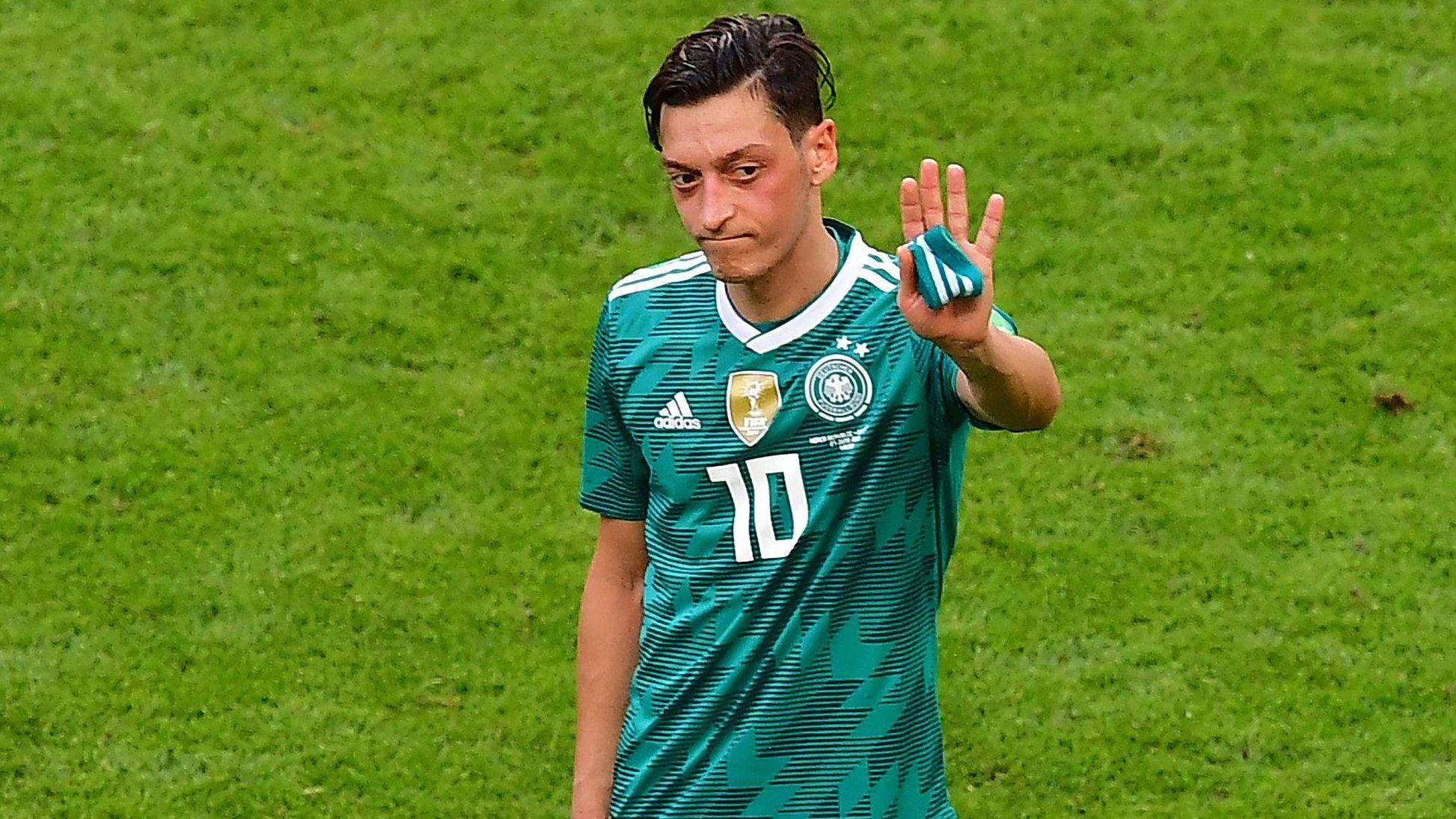
German soccer star Mesut Ozil said on Sunday he will no longer play for the national team because he has faced "racism and disrespect" because of his Turkish roots.
His impassioned statement is one of the strongest issued by a player in recent years on the subject of racism, but it has been met with mixed reactions.
It comes amid a political debate in Germany about the influx of 1.6 million migrants since mid-2014 that has seen a rise of the far right at the expense of traditional parties.
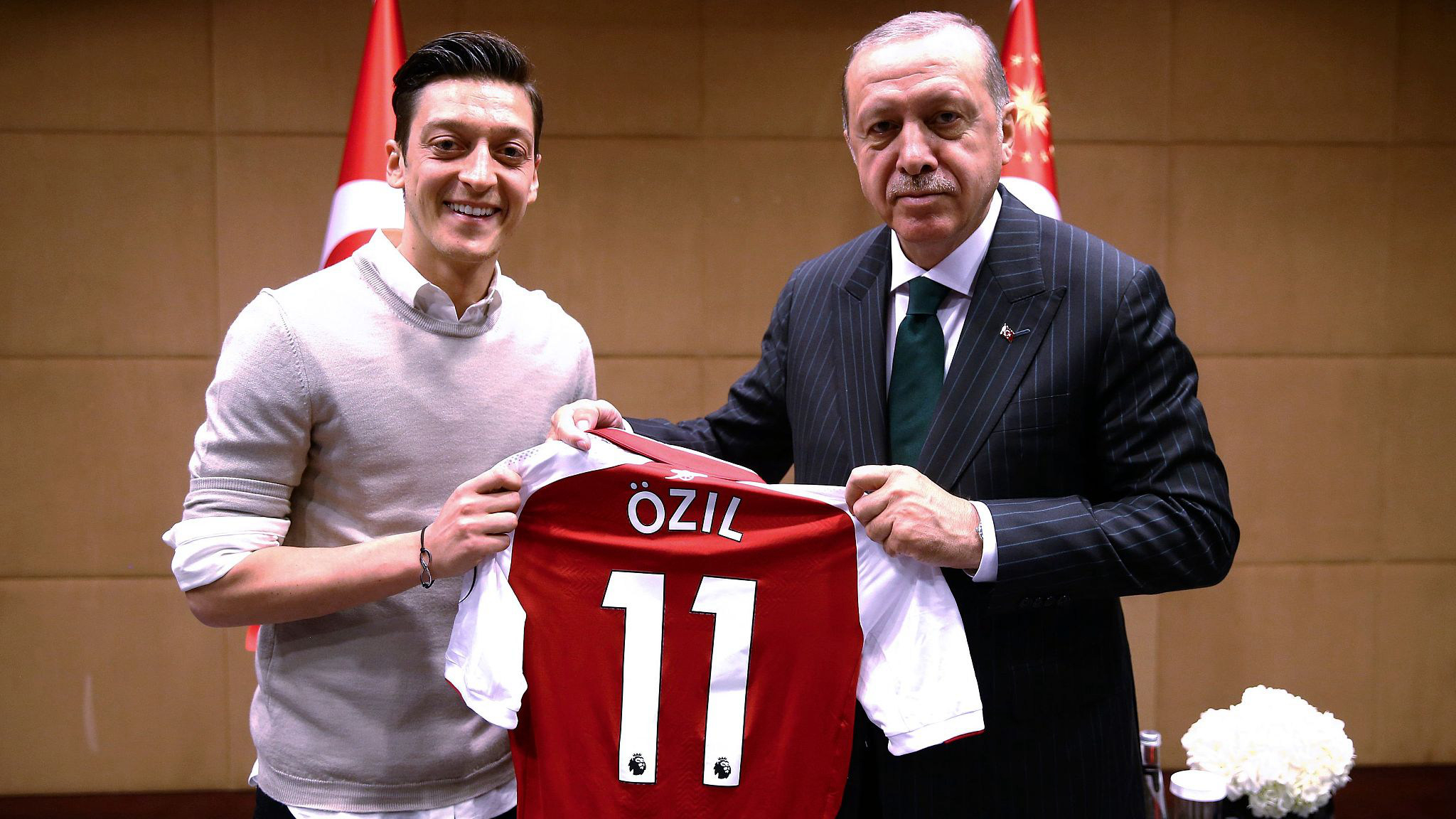
Turkish President Recep Tayyip Erdogan (R) poses for a photo with German footballer of Turkish origin Mesut Ozil (L) in London, May 14, 2018. /VCG Photo
Turkish President Recep Tayyip Erdogan (R) poses for a photo with German footballer of Turkish origin Mesut Ozil (L) in London, May 14, 2018. /VCG Photo
Ozil, 29, was a key member of Germany's World Cup-winning side in 2014 and has been voted by fans as the team's player of the year five times since 2011.
But the creative midfielder faced a barrage of criticism at home for having his photograph taken with Turkish President Racep Tayyip Erdogan in May.
He and Ilkay Gundogan, a team mate also of Turkish descent who posed with Erdogan as well, were jeered by German fans in warm-up games before the World Cup in Russia.
Germany failed to qualify from the group stage, making it their earliest exit from the tournament in 80 years and Ozil was one of the scapegoats for their unsuccessful title defense.
Ozil, who plays his club football at Arsenal in the Premier League, said German Football Association (DFB) President Reinhard Grindel had blamed him for Germany's poor performance.
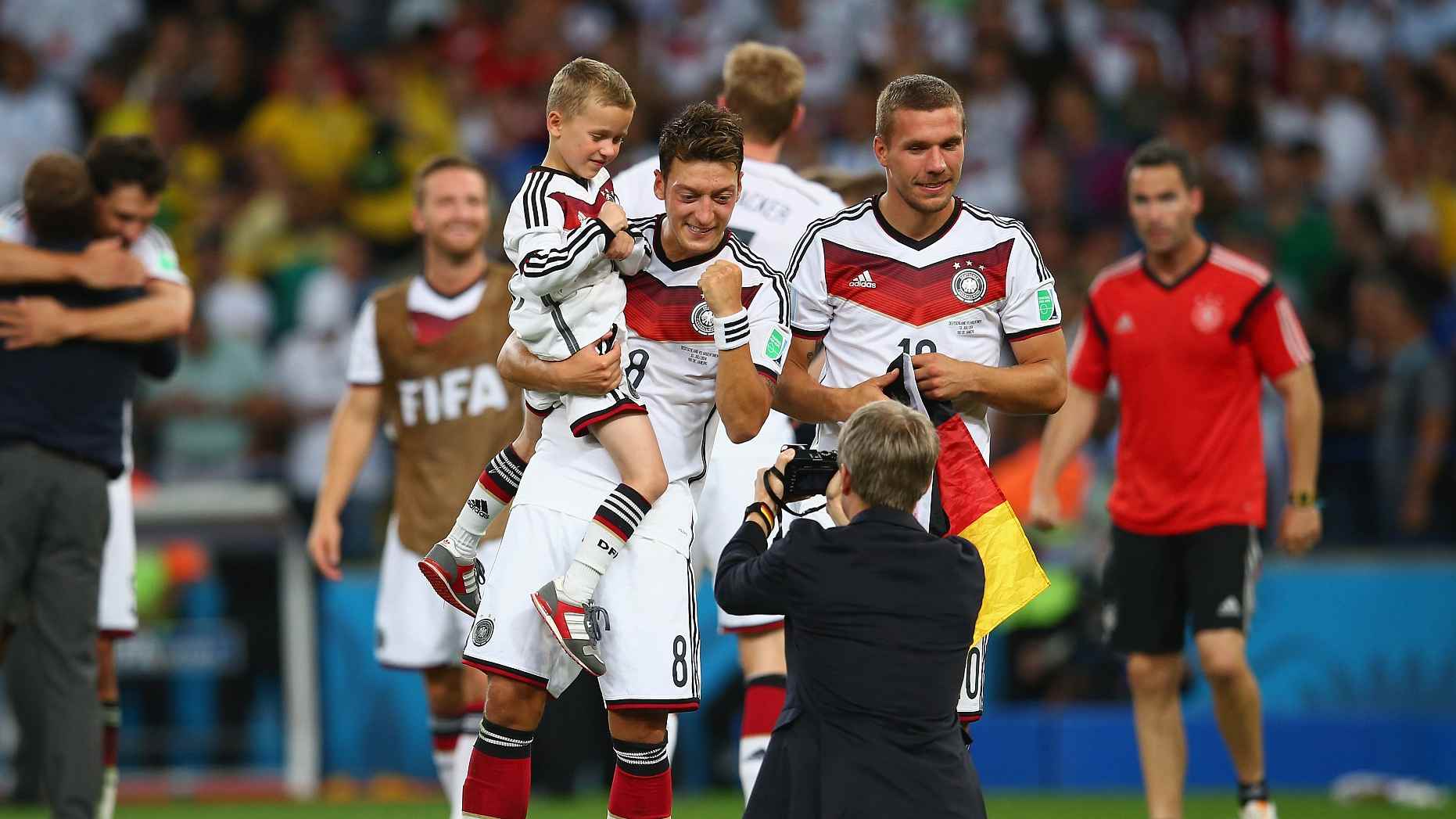
Mesut Ozil of Germany (C) celebrates with Lukas Podolski (R) and his son Louis Podolski after defeating Argentina 1-0 in extra time during the 2014 FIFA World Cup Brazil Final match between Germany and Argentina at Maracana on July 13, 2014 in Rio de Janeiro, Brazil. /VCG Photo
Mesut Ozil of Germany (C) celebrates with Lukas Podolski (R) and his son Louis Podolski after defeating Argentina 1-0 in extra time during the 2014 FIFA World Cup Brazil Final match between Germany and Argentina at Maracana on July 13, 2014 in Rio de Janeiro, Brazil. /VCG Photo
"In the eyes of Grindel and his supporters I am German when we win, but I am an immigrant when we lose," Ozil wrote in a lengthy statement in English posted on his Twitter account.
He added he did not feel accepted in German society despite paying taxes there, making donations to German schools and being part of the team that won the World Cup.
"It is with a heavy heart and after much consideration that because of recent events, I will no longer be playing for Germany at international level whilst I have this feeling of racism and disrespect," he said.
"I used to wear the German shirt with such pride and excitement, but now I don't," he said. "I feel unwanted and think that what I have achieved since my international debut in 2009 has been forgotten."
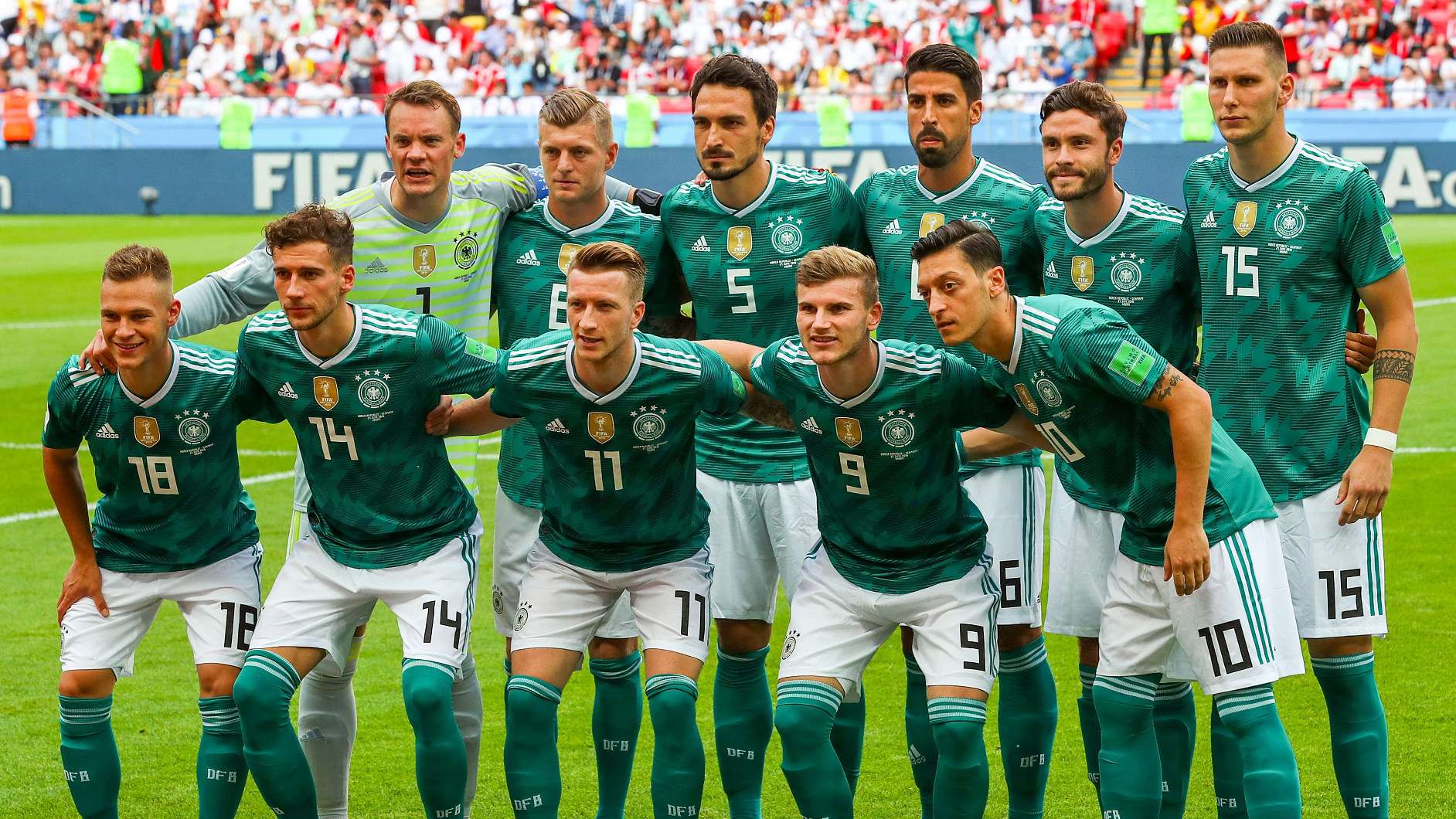
Germany national team pose ahead of their 2018 FIFA World Cup Group F match against S. Korea at Kazan Arena Stadium, Russia, June 27, 2018. /VCG Photo
Germany national team pose ahead of their 2018 FIFA World Cup Group F match against S. Korea at Kazan Arena Stadium, Russia, June 27, 2018. /VCG Photo
Dual heritage
Many European footballers who play for national teams have a heritage in a different country but it is extremely rare for such players to cite racism resulting from those roots as a reason to abandon their national side.
There is also a debate about whether enough is done to stamp out racism in the sport, which many black players have faced over the decades often in the form of chants by opposing fans.
Ozil questioned whether there were criteria for being German that he did not meet and asked why he should be referred to as German-Turkish when fellow German soccer players Lukas Podolski and Miroslav Klose were not referred to as German-Polish.
"Is it because it is Turkey? Is it because I'm a Muslim? I think here lays an important issue," he said.
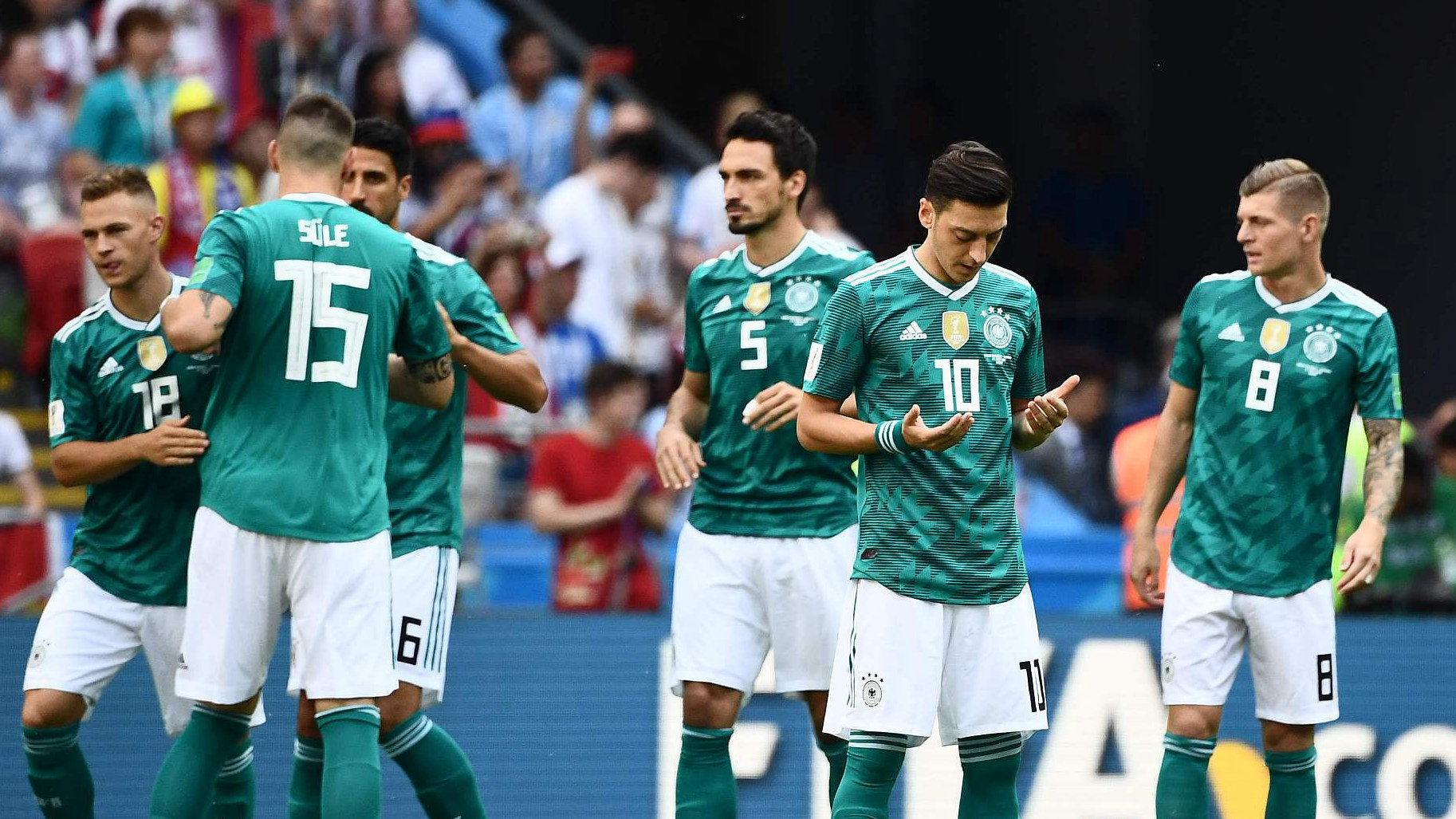
Mesut Ozil prays before the match. /VCG Photo
Mesut Ozil prays before the match. /VCG Photo
Germany's Social Democrat Justice Minister Katarina Barley said on Twitter: "It's alarming if a great German football player like Mesut Ozil no longer feels wanted in his country and doesn't feel represented by the DFB due to racism."
Veteran Greens lawmaker Cem Ozdemir, who has Turkish roots, said Ozil's photo was wrong and his explanation unconvincing but added: "The way the DFB leadership acted is at least as disastrous – Grindel is hacking our history of integration to pieces. Do they want young German-Turks to start playing for Erdogan soon? The DFB needs a fresh start."
But others criticised Ozil, with Thomas Bareiss, a senior member of Chancellor Angela Merkel's conservatives, saying Ozil's accusations of racism and a lack of respect were "out of place."
Popular German newspaper Bild said: "Ozil is reveling in the victim role that has nothing to do with reality." Ozil has 92 caps for Germany and has scored 23 goals.
Earlier on Sunday, Ozil defended the photograph in which he was pictured smiling with Erdogan, who was campaigning for re-election at the time.
"For me having a picture with President Erdogan wasn't about politics or elections, it was about me respecting the highest office of my family's country," he said.
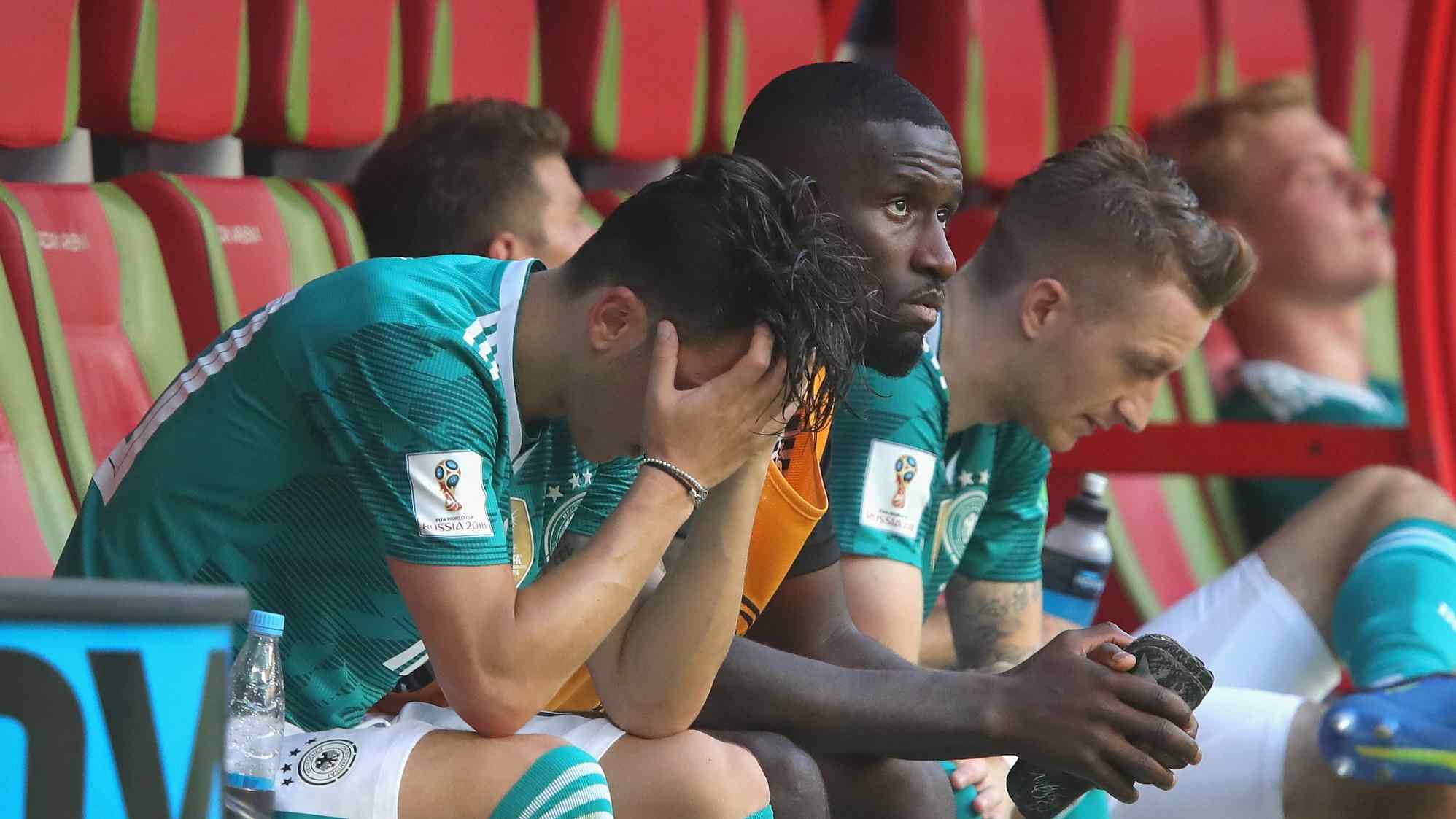
Mesut Ozil of Germany looks dejected following his sides defeat in the 2018 FIFA World Cup Russia group F match between S. Korea and Germany at Kazan Arena on June 27, 2018. /VCG Photo
Mesut Ozil of Germany looks dejected following his sides defeat in the 2018 FIFA World Cup Russia group F match between S. Korea and Germany at Kazan Arena on June 27, 2018. /VCG Photo
'Two hearts. One German, one Turkish'
Relations between Germany and Turkey have soured amid a crackdown by Erdogan's government on suspected supporters of a failed military coup in July 2016. Germany is home to some 3 million people with Turkish roots.
Germany and Turkey are both bidding to host the Euro 2024 tournament and UEFA will hold a meeting on Sept. 27 to choose between them.
Ozil said his mother had always told him to be respectful and remember his ancestry, heritage and family traditions, adding: "I have two hearts, one German and one Turkish."
Many fans and politicians in Germany were angered by the photo with Erdogan and it was widely criticized by politicians and Germany's football federation, which argued that Erdogan did not sufficiently respect German values.
(Video Credit: Sports Scene)
Source(s): Reuters







